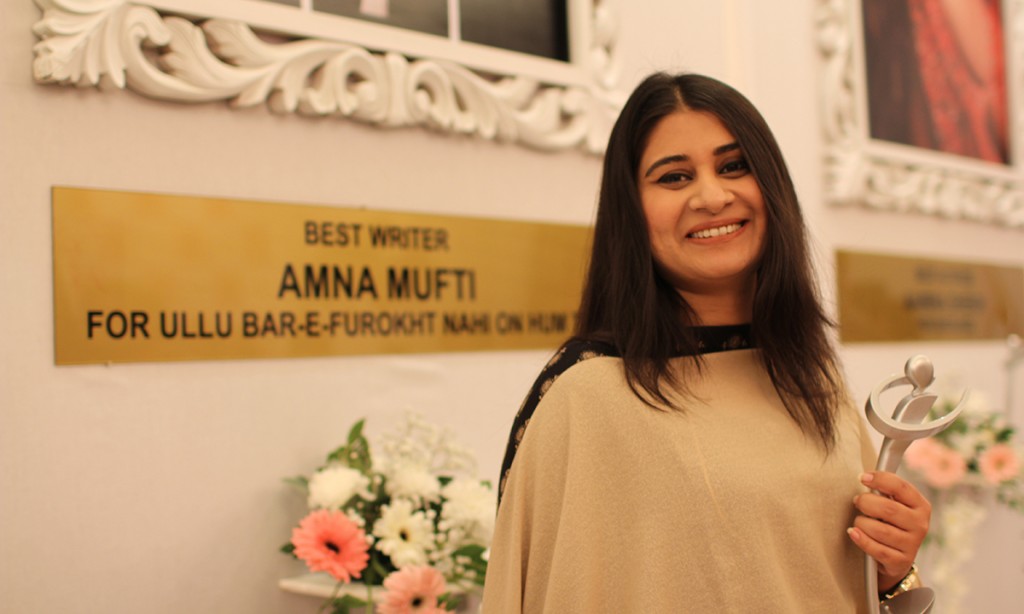Amna Mufti is no new face in the Pakistan television industry. With a career spanning over a decade, the novelist and film writer has belted out some noteworthy scripts in her career. Her most popular works include Jahez, Sabz Pari Laal Kabootar, Ullu Baraye Farokht Nahi, Mol, and Akhri Station, all of which have been lauded for their promising storylines and powerful impact on viewers. Talking to The Brown Identity in a recent interview, the acclaimed author and playwright opened up about writing, film, how she has been spending her time during the Covid-19 lockdown and popular ‘criticism’.
Kicking off the conversation, Amna said, “I have been wanting to write a novel for a while now and I am finally halfway through one since shootings have stopped and the drama industry is moving relatively slowly. The name is Akhtari. It is a trilogy which will start in the first half of the 20th century and end in the 80s or 90s.” She instantly delved into the fast popularity of web shows while also expressing eagerness to write one of her own. “My age writers want to explore web series too now since it is something new and different for us,” shared Amna.
Speaking about her distinct writing style, she mentioned, “I don’t think art of commercialism are two different things or popular writing is a special kind of Literature that only certain people are good at. This is not true. Everyone has their own expertise. From Shagufta Apa to Faiza Iftikhar, everyone has their own outlook and personality where their style of writing comes from. We cannot be compared to each other.” Amna added, “Many people don’t know me. I have a cult following. The ones who appreciate my work will search for it and watch it. There maybe a difference between Faiza being ‘popular’ and me being ‘nonpopular’ but both our approaches are different and hence comparisons cannot be made on whose work is better.”
Her hit work Jahez has been plagiarized several times and Amna was also requested to pen its sequel. “Jahez was a challenge and I thought why not write more of it. I designed it such that I wanted to take out at least eight sequels and I still want to. But when the time is right.” Amna also disclosed how there is a lot of unfairness and unprofessionalism in the drama industry, with blatant stealing of names and work prevalent. Speaking about whether there are unions for writers to fight for their right, she said,
“It is sad but writing is not considered to be a proper profession in our country.” She expressed great fondness for Bollywood director Anurag Kashyap’s aesthetic. “Tastes evolve with time and they keep changing. I like Anurag’s work because it depicts the reality of how life really is. I wish such stuff is made in Pakistan too. The people after saas-bahu dramas need to know that such kind of stuff is a thing of the past. A lot of new and fresh work has come after that and fared well commercially.” It is safe to say that Pakistani audiences promote self-hate and unnecessarily bashing instead of healthy discourse and criticism.
http://thebrownidentity.com/2020/08/10/oscar-winning-filmmaker-sharmeen-obaid-chinoy-nominated-for-an-emmy/
Reflecting on this, Amna stated, “When one person starts hating, everyone else follows suit. That’s how our society and the exaggerated way in which we convey and spread messages also shows that. No matter how ‘cool’ we become, this aspect will not change.” She also elaborated on media cells and fake accounts, some of which are created by writers too, who target those artists they want to bring down. “Most vocal people on social media don’t have real accounts. They have accounts under all sorts of strange names, either to promote themselves or bash those they don’t like.” She urged everyone to open their minds. “People think if a woman is writing something, it will not be good because she is a ‘bahu’. What does that even mean? If people have a problem then the institution of marriage should be dissolved altogether. Art is very fragile. We must understand it better to take it forward,” concluded Amna.
Watch the full conversation here:
